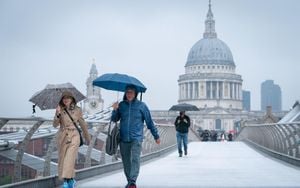Archaeologists have recently made headlines with the fantastic discovery of a well-preserved section of one of Britain's most significant Roman roads, known as Watling Street, located underneath Old Kent Road in Southwark, London. This marked the first major find of its kind related to the Roman-era roadway since the discovery of other ancient sites. The archaeologists involved have described the find as “remarkable,” highlighting its importance to both history and heritage.
The 2,000-year-old Watling Street historically ran from the Roman port at Dover, through the heart of London, all the way to the West Midlands, covering approximately 276 miles. Constructed shortly after the Roman invasion of Britain around AD 43, this road played a pivotal role, not just for local travel but also as part of the expansive network facilitating trade and military movement across the Empire. It hosted many imperial visits, including Emperor Hadrian's passage during the construction of his famous wall separating England from Scotland around AD 122.
Until this finding, pinpointing the precise path of Watling Street through London had proven particularly challenging for archaeologists. They had relied on historical texts and previous excavations to theorize its direction, but the evidence often appeared scant or confusing. Gillian King, one of the leading archaeologists on the project, expressed delight about the clarity the discovery has provided. She remarked, “It is a key finding for archaeological research for London,” underscoring how much this single discovery could shift current understandings of Roman infrastructure in the city.
What they found beneath the surface is truly fascinating. The revealed stretch of road measures about 19 feet (5.8 meters) wide and stands nearly 5 feet (1.4 meters) high. The layers uncovered provide insight not just about the road's construction but also about how Romans engineered their roads for durability. The archaeologists noted distinct layers showing compacted gravel, two layers of chalk, and another layer of compacted sand and gravel — the original road surface likely made from similar materials but has been worn away over time.
Evidence suggests this section of road might have been somewhat raised, similar to the current street level, which is typical of Roman engineering. Historical discoveries like this one don’t just add to the history of London but serve to reconfigure the broader narrative of Britain's Roman past. According to Chris Constable, Southwark Council’s archaeology officer, the find helps answer long-standing questions surrounding the road’s alignment through the capital. The previous excavation of another section led to more inquiries than answers, leaving many details mysterious until now.
The importance of Watling Street isn't just historical; it's cultural. The Roman road served as not merely a route for cobbled stones but as a lifeline connecting different regions, helping to establish communities and commerce. This latest discovery serves as a reminder of London’s deep and convoluted layers of history, where modern construction frequently intersects with ancient pathways. Excavations for updates on the city's low-carbon heat network inadvertently turned the pages on history, allowing us to step back to see what the Romans built.
Interestingly, parts of Watling Street were rediscovered much earlier. During the rebuilding of St Mary-le-Bow by architect Christopher Wren after the Great Fire of London from 1666, some traces of the Roman road became visible. Connecting the dots from various finds over the centuries, researchers can now paint clearer pictures of how Roman roads facilitated not only transportation but also economic and cultural exchange.
Looking forward, archaeologists are excited about what this discovery means for London's history. It's more than just another street; it's part of the city’s foundational story. Each shovel of dirt removed from the site counts as another piece of the diverse puzzle of cultural heritage, shaping the dialogue between past and present. With new lines drawn on maps of ancient London, historians can refine their understandings of urban development and the Roman Empire's influence.
Overall, this archaeological find beneath Old Kent Road brings hope and wonder to historians and locals alike. It shows how excavation and research can yield insights about our shared past, offering not just bricks and mortar but stories about the lives and cultures of people long gone. Watling Street is more than just ancient stones; it's history waiting to be explored again, shedding light on what life may have looked like when Romans walked the same paths we traverse today.
London, with its exhaustive history, continues to offer exciting opportunities for historians and archeological circles. Each dig, each discovery transforms not just our cities today, but our entire comprehension of how societies functioned and connected thousands of years ago. For those passionate about history, the unearthing of Watling Street is just another chapter of intrigue and exploration — and certainly not the last layer awaiting discovery underneath the hustle and bustle of one of the world's most dynamic cities.



